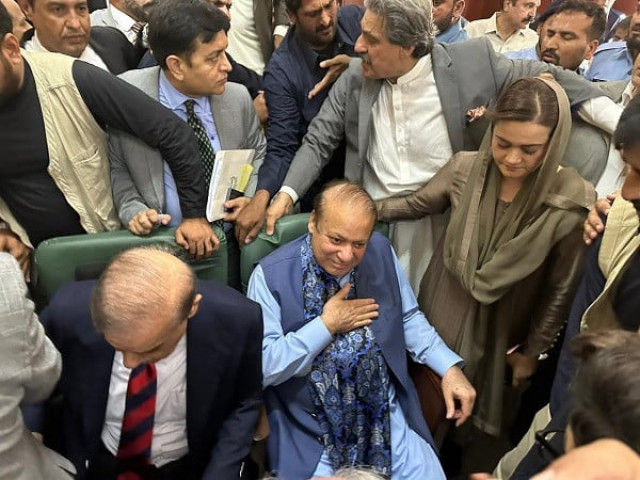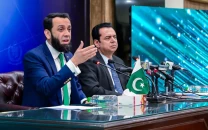Nawaz receives further relief from IHC
High court reinstates former PM’s appeals against conviction in Avenfield, Al-Azizia cases

The capital’s high court on Thursday accepted former prime minister Nawaz Sharif’s requests to revive his appeals against his 2018 convictions in two separate corruption cases. This came after the top accountability watchdog informed the bench that it had no objection to the court hearing the appeals.
A division bench of the Islamabad High Court (IHC), led by Chief Justice Aamer Farooq and comprising Justice Miangul Hassan Aurangzeb, took up the application that the PML-N supreme leader had submitted to the court on Tuesday, shortly after his return to the country following a four-year self-imposed exile.
Nawaz Sharif was convicted in the Avenfield case in July 2018 and the Al-Azizia case in December of the same year. He subsequently filed appeals against his convictions in the IHC.
While the court was still in the process of hearing the appeals, the PML-N leader flew to London in November 2019 after receiving rare permission for medical treatment abroad.
As a result, an IHC bench led by Justice Farooq dismissed the appeals on June 24, 2021, due to Nawaz's failure to appear in the case hearings.
At the beginning of the hearing on Thursday, National Accountability Bureau (NAB) Prosecutor-General Ehtesham Qadir emphasized the prosecutor's responsibility not to conceal any evidence favoring the accused. The prosecutor should remain impartial and not be biased toward the accused.
Qadir explained that Nawaz Sharif's appeals were rejected for his non-appearance, and a permanent arrest warrant was issued in this case. He added, “This court had directed that when he surrenders, action should be taken according to the law. Now NAB has no objections to the restoration of appeals.”
When Justices Aurangzeb asked the prosecutor if he would present evidence in favor of the verdicts of the accountability courts that found Nawaz guilty of corruption, he replied that in the first phase, he only wanted to state that NAB had no objections to the restoration of appeals.
“If the appeals are reinstated, then we will assess the evidence and take a position in court.” He stated that he and the NAB chairman share the opinion that they have no objection to the reinstatement of the appeals.
In response to a court query about NAB considering the withdrawal of its references against Nawaz, he explained that NAB could not withdraw the references after filing appeals. “A reference can only be withdrawn when an accountability court has not delivered its verdict,” he clarified.
Nawaz’s counsel, Amjad Pervaiz Advocate, pointed out that when the IHC acquitted the PML-N supreme leader’s co-accused Maryam Nawaz in the Avenfield case, it clarified everyone's role.
“The court had stated that NAB was given multiple opportunities, but it failed to establish Nawaz Sharif’s role in the Avenfield case.” Another of his lawyers, Azam Nazeer Tarar, mentioned that examining the acquittal of co-accused in the Avenfield reference would address many issues.
Tarar also noted that in his 30-year career, he had never seen appeals not being reinstated after a suspect's surrender and presented court decisions regarding the reinstatement of appeals.
When the chief justice inquired if NAB wanted Nawaz Sharif's arrest, NAB prosecutor-general replied that he had already mentioned they do not want it at all. He stated that there is no court order to arrest Nawaz Sharif in any decision.
“At most, the court can ask for new bail sureties from him.” The court observed that NAB has taken a very clear position. After reviewing the evidence, the court reserved the decision, and subsequently, the court reinstated the appeals through a brief order.



















COMMENTS
Comments are moderated and generally will be posted if they are on-topic and not abusive.
For more information, please see our Comments FAQ